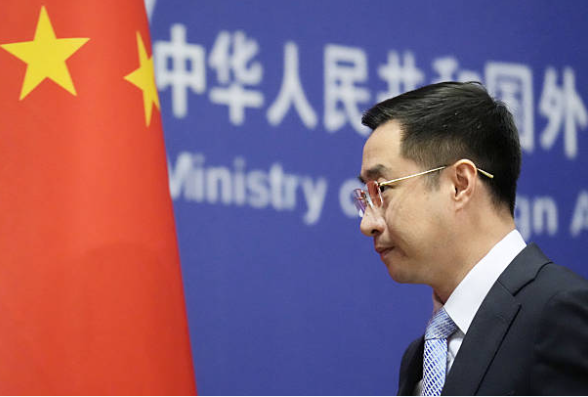Beijing Slams U.S. Official for ‘Cold War Mentality’ Following Shangri-La Dialogue Remarks
China has strongly criticized U.S. commentator and political figure Pete Hegseth after he delivered a warning-laden speech at the Shangri-La Dialogue, a major security forum held in Singapore. Hegseth accused Beijing of actively preparing for military confrontation in the Indo-Pacific, raising concerns over a potential invasion of Taiwan.
 |
| Chinese Foreign Ministry spokesman Lin Jian attends a press conference in Beijing on May 30, 2025. (Photo by Kyodo News via Getty Images) |
In his address on Saturday, Hegseth claimed that China poses an immediate and credible threat, asserting that the country is "actively rehearsing" military operations aimed at altering the strategic balance in the region. He urged Indo-Pacific nations to boost defense investments in response to what he described as China’s aggressive posture.
“There’s no reason to sugarcoat it. The threat from China is real — and could be imminent,” Hegseth declared during the keynote session of the conference.
China Responds: ‘Speech Was Provocative and Divisive’
China’s Ministry of Foreign Affairs responded sharply on Sunday, denouncing Hegseth’s comments as “provocative” and accusing him of attempting to fracture unity in the Asia-Pacific. In an official statement, the ministry described his rhetoric as promoting a Cold War mindset and pushing countries into “bloc confrontations.”
“Hegseth blatantly ignored the region’s collective call for peace and cooperation. His remarks were filled with unfounded accusations, intended to sow discord and mislead the international community,” the ministry said.
Beijing also rejected the notion that China seeks to establish regional dominance, stating:
“No country deserves the label of ‘hegemonic power’ more than the United States, which has consistently destabilized peace in the Asia-Pacific.”
Taiwan and the Risk of Conflict
One of the central themes of Hegseth’s speech was the growing risk surrounding Taiwan, which China views as a breakaway province. Beijing reiterated its stance, warning against any support for what it calls “Taiwanese separatist movements,” and accused Hegseth of “playing with fire” on the matter.
Taiwan, however, maintains its independent, democratically elected government and has repeatedly rejected Chinese claims over its sovereignty.
Regional Leaders Weigh In
Speaking separately on Sunday, Australia’s Defence Minister Richard Marles rejected China’s criticism and emphasized that the Indo-Pacific's strategic complexity is largely a result of China's unprecedented military expansion.
“This is the largest peacetime military build-up by any nation since World War II,” Marles stated. “It’s a critical factor shaping the regional security environment.”
He noted that Australia continues to collaborate closely with allies, including the United States and the Philippines, to uphold international maritime laws and freedom of navigation. Marles stressed that maintaining the rules-based international order is vital for long-term stability.
China’s Minimal Presence at Shangri-La Dialogue Raises Eyebrows
Unlike previous years, China opted to send only a small delegation to this year's Shangri-La Dialogue. Rear Admiral Hu Gangfeng, representing the People’s Liberation Army, criticized several participants during a panel for allegedly inciting regional division and falsely portraying China as a threat.
“Some countries are increasing their military footprint in the name of ‘freedom of navigation’ while interfering in regional disputes,” Hu said. “This is destabilizing and fuels separatist sentiments in Taiwan.”
China has long claimed sovereignty over most of the South China Sea, a position rejected by a 2016 international tribunal ruling in The Hague, which found China's maritime claims to be without legal basis.
Singapore Calls for Open Dialogue with China
Closing out the conference, Singapore’s Defence Minister Chan Chun Sing emphasized the importance of open and continuous communication with Beijing. He noted that China’s limited participation in the event was a missed opportunity.
“It’s vital that China engages fully in these platforms. If we misunderstand or miscalculate each other’s intentions, the risk of unintended conflict increases,” Chan warned.



